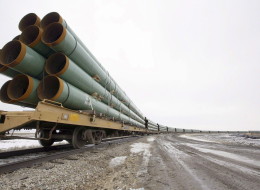CALGARY - The CEO of TransCanada Corp. sees opportunities to build new oil pipelines in Mexico, which is poised to end its government's monopoly on energy development and open its oilfields up to foreign players.
To the extent that Mexico, already a crude exporter, is able to ramp up its flagging production as a result of the changes, it will likely be eager to send more of its crude to lucrative Asian markets — much as has been the case in Canada in recent years, Russ Girling said.
"That's where companies like us can come in with our capital and our expertise and build the infrastructure necessary to get it to a place where they can export from," he said in an interview.
TransCanada already has two natural gas pipelines in Mexico. The Guadalajara pipeline to the Pacific Coast and the Tamazunchale line in the east-central part of the country.
Oil pipelines could be TransCanada's next move in Mexico.
"That's a market that we enjoy working in, one that we could see is above board and objective," said Girling.
"What we bring to the table is obviously our capital, but probably more importantly is our expertise in some of the more difficult terrain and remote terrain in Mexico."
In its Mexican gas pipeline business, Girling said the company has had to deal with "startling topography."
"There's not many companies with the expertise we have over our mountain ranges and those kinds of things."
TransCanada is awaiting U.S. government approval to build its US$5.4 billion Keystone XL pipeline more than five years after it first applied for a permit. That 830,000-barrel-a-day line would connect to an existing system that delivers crude to the U.S. Midwest and Cushing, Okla. Girling expects a decision from the U.S. State Department in the first quarter of 2014.
A US$2.3 billion line between Cushing and Texas refineries — part of an earlier iteration of Keystone XL before the project was broken up into two — is expected to start shipping crude on Jan. 22. TransCanada was able to go ahead with the Gulf Coast segment first because it doesn't cross an international border.
One of the main drivers behind Keystone XL has been to ship heavy oilsands crude to Gulf Coast refiners to displace declining imports from Mexico and Venezuela.
Girling said he doesn't see a potential ramp up from Mexico as a threat to Keystone XL.
Gulf Coast refiners import 4.5 million barrels from overseas and Keystone XL, if approved, wouldn't come close to supplanting that, he said.
"I think the market's big enough for everybody," Girling said.
"There's room for Mexico to come on. I believe that Mexico is smart as well. They're not going to be dependent on one market either. They'll build pipeline access to their West Coast. The biggest growth market for crude oil in the world is the Asian market. India, China are going to drive the growth."
Original Article
Source: huffingtonpost.ca/
Author: Lauren Krugel
To the extent that Mexico, already a crude exporter, is able to ramp up its flagging production as a result of the changes, it will likely be eager to send more of its crude to lucrative Asian markets — much as has been the case in Canada in recent years, Russ Girling said.
"That's where companies like us can come in with our capital and our expertise and build the infrastructure necessary to get it to a place where they can export from," he said in an interview.
TransCanada already has two natural gas pipelines in Mexico. The Guadalajara pipeline to the Pacific Coast and the Tamazunchale line in the east-central part of the country.
Oil pipelines could be TransCanada's next move in Mexico.
"That's a market that we enjoy working in, one that we could see is above board and objective," said Girling.
"What we bring to the table is obviously our capital, but probably more importantly is our expertise in some of the more difficult terrain and remote terrain in Mexico."
In its Mexican gas pipeline business, Girling said the company has had to deal with "startling topography."
"There's not many companies with the expertise we have over our mountain ranges and those kinds of things."
TransCanada is awaiting U.S. government approval to build its US$5.4 billion Keystone XL pipeline more than five years after it first applied for a permit. That 830,000-barrel-a-day line would connect to an existing system that delivers crude to the U.S. Midwest and Cushing, Okla. Girling expects a decision from the U.S. State Department in the first quarter of 2014.
A US$2.3 billion line between Cushing and Texas refineries — part of an earlier iteration of Keystone XL before the project was broken up into two — is expected to start shipping crude on Jan. 22. TransCanada was able to go ahead with the Gulf Coast segment first because it doesn't cross an international border.
One of the main drivers behind Keystone XL has been to ship heavy oilsands crude to Gulf Coast refiners to displace declining imports from Mexico and Venezuela.
Girling said he doesn't see a potential ramp up from Mexico as a threat to Keystone XL.
Gulf Coast refiners import 4.5 million barrels from overseas and Keystone XL, if approved, wouldn't come close to supplanting that, he said.
"I think the market's big enough for everybody," Girling said.
"There's room for Mexico to come on. I believe that Mexico is smart as well. They're not going to be dependent on one market either. They'll build pipeline access to their West Coast. The biggest growth market for crude oil in the world is the Asian market. India, China are going to drive the growth."
Original Article
Source: huffingtonpost.ca/
Author: Lauren Krugel

No comments:
Post a Comment